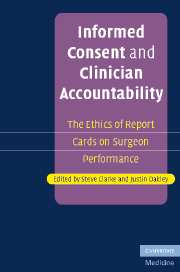Book contents
- Frontmatter
- Contents
- List of contributors
- Acknowledgements
- Introduction: Accountability, informed consent and clinician performance information
- Part I Accountability
- Part introduction
- 1 Clinician report cards and the limits of evidence-based patient choice
- 2 Report cards for institutions, not individuals
- 3 Safety, accountability, and ‘choice’ after the Bristol Inquiry
- 4 Public reports: putting patients in the picture requires a new relationship between doctors and patients
- 5 Adverse event disclosure: benefits and drawbacks for patients and clinicians
- 6 Report cards and performance monitoring
- Part II Informed consent
- Part III Reporting performance information
- Index
- References
3 - Safety, accountability, and ‘choice’ after the Bristol Inquiry
Published online by Cambridge University Press: 08 August 2009
- Frontmatter
- Contents
- List of contributors
- Acknowledgements
- Introduction: Accountability, informed consent and clinician performance information
- Part I Accountability
- Part introduction
- 1 Clinician report cards and the limits of evidence-based patient choice
- 2 Report cards for institutions, not individuals
- 3 Safety, accountability, and ‘choice’ after the Bristol Inquiry
- 4 Public reports: putting patients in the picture requires a new relationship between doctors and patients
- 5 Adverse event disclosure: benefits and drawbacks for patients and clinicians
- 6 Report cards and performance monitoring
- Part II Informed consent
- Part III Reporting performance information
- Index
- References
Summary
Ever since the Inquiry into paediatric mortality rates at the Royal Bristol Infirmary, there has been strong pressure in the UK for greater monitoring and reporting of the performance of surgeons. The inquiry, chaired by Sir Ian Kennedy, was asked not only to investigate the disproportionate number of deaths among infants operated upon in Bristol in the 1980s and early 1990s, but to make recommendations that might be acted upon throughout the National Health Service (NHS). Kennedy reported in 2002. Some of the recommendations went far beyond the question of how best to ensure the safety of paediatric surgery, or even of surgery in general. They called for a ‘patient-centred’ NHS. This theme was enthusiastically taken up in the government response to Kennedy, and there are noticeable affinities between the idea of patient-centredness and the idea of ‘patient choice’, which is at the heart of UK government health policy.
Patient-centredness in Kennedy's sense is broader than patient safety: it extends to public involvement in national policy-making, and public and patient involvement in decision-making structures of local NHS trusts. In my view, both of these ways of involving patients and the public are at best loosely connected to the problems in Bristol that prompted the inquiry. Nevertheless, they were accepted by the UK government in its response to Kennedy, and in subsequent policy documents. Partly as a result, Department of Health (DoH) policy now runs together, or comes close to running together, the answers to four distinct questions:
How can surgeons who are not equal to the kinds of operations they are attempting – whose patients avoidably die or suffer complications – be identified and retrained?
[…]
- Type
- Chapter
- Information
- Informed Consent and Clinician AccountabilityThe Ethics of Report Cards on Surgeon Performance, pp. 52 - 64Publisher: Cambridge University PressPrint publication year: 2007
References
- 1
- Cited by



